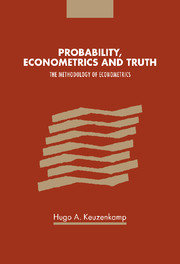Book contents
- Frontmatter
- Contents
- Introduction
- 1 The philosophy of induction
- 2 Probability and indifference
- Intermezzo: a formal scheme of reference
- 3 Relative frequency and induction
- 4 Probability and belief
- 5 The theory of simplicity
- 6 From probability to econometrics
- 7 Econometric modelling
- 8 In search of homogeneity
- 9 Positivism and the aims of econometrics
- 10 Probability, econometrics and truth
- Personalia
- References
- Name Index
- Subject Index
4 - Probability and belief
Published online by Cambridge University Press: 22 September 2009
- Frontmatter
- Contents
- Introduction
- 1 The philosophy of induction
- 2 Probability and indifference
- Intermezzo: a formal scheme of reference
- 3 Relative frequency and induction
- 4 Probability and belief
- 5 The theory of simplicity
- 6 From probability to econometrics
- 7 Econometric modelling
- 8 In search of homogeneity
- 9 Positivism and the aims of econometrics
- 10 Probability, econometrics and truth
- Personalia
- References
- Name Index
- Subject Index
Summary
Probability does not exist.
Bruno de Finetti (1974, p. x)Introduction
Probability in relation to rational belief has its roots in the work of Bayes and Laplace. Laplace is known for his interest in the ‘probability of causes’, inference from event A to hypothesis H, P(H|A). This is known as inverse probability, opposed to direct probability (inference from hypothesis to events, P(A|H). Inverse probability is part of epistemology, the philosophical theory of knowledge and its validation. The acquisition of knowledge, and the formulation of beliefs, are studied in cognitive science. Of particular interest is the limitation of our cognitive faculties. In this chapter, the epistemological approaches to probability are discussed.
The unifying characteristic of the different interpretations of epistemological probability is the emphasis on applying Bayes' theorem in order to generate knowledge. All interpretations in this chapter are, therefore, known as Bayesian. Probability helps to generate knowledge, it is part of our cognition. It is not an intrinsic quality that exists independently of human thinking. This is the message of the quotation from de Finetti, faturing as the epigraph to this chapter: probability does not exist. Probability is not an objective or real entity, but a construct of our minds.
This chapter first introduces the theory of logical probability of Keynes (section 2) and Carnap (section 3). Section 4 deals with the personalistic (‘subjective’) interpretation of probability theory. The construction of prior probabilities, one of the great problems of epistemological probability, is the topic of section 5.
Information
- Type
- Chapter
- Information
- Probability, Econometrics and TruthThe Methodology of Econometrics, pp. 67 - 97Publisher: Cambridge University PressPrint publication year: 2000
